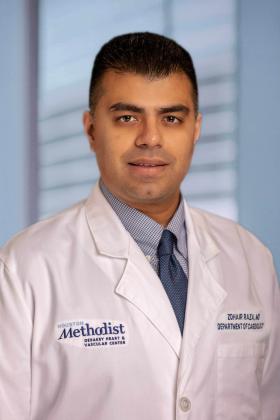Signs It's Time to See a Cardiologist
Given that heart disease remains the nation's No. 1 killer of adults, it hardly needs noting that keeping the organ in peak condition should be a top priority.
Doctors habitually promote exercise and a healthy diet to reduce their risk of heart disease. But people still develop heart issues, one reason someone in the U.S. dies from cardiovascular disease every 36 seconds.
It's also a reason more people should see a cardiologist. Specialists in diseases of the heart and blood vessels, cardiologists administer and evaluate tests, manage patients' risk factors, determine the best treatment and prevent complications.
Dr. Zohair Raza, a cardiologist at Houston Methodist Baytown, lays out the symptoms that warrant an immediate visit to a cardiologist, the risk factors that signal you already should have a cardiologist and what to expect at your first appointment, including specific tests. His bottom-line message: It's almost never too soon to see a cardiologist.
"I would say the earlier, the better," says Dr. Raza. "You never want to wait too long."
Who should schedule an appointment?
Definitely see a cardiologist if you're experiencing:
- Chest pain
- Shortness of breath
- Abnormally fast or slow heart rate
- Swelling in your legs
- Dizziness or fainting
"Sometimes people don't have these classic symptoms, but they would still benefit from seeing a cardiologist because they know they're not doing well," says Dr. Raza. "It is also good to know where you stand in the spectrum of your cardiovascular health, from knowledge to practice."
Ideally, it doesn't come to an acute issue. The best time to seek out a cardiologist is based on risk factors before symptoms hit.
What risk factors make you a candidate?
It's time to schedule an appointment if you have any of the following key risk factors:
1. A family history of heart disease
2. A history of smoking
3. Diabetes
4. High cholesterol
5. High blood pressure
What should you expect at your appointment with a cardiologist?
Dr. Raza says your first cardiology appointment will include a complete assessment of your symptoms, an analysis of your risk factors and an estimate of where you stand in terms of tests needed.
Presumably, your primary care doctor already has conducted tests to determine your cholesterol, glucose and blood pressure. Depending on your condition, your cardiologist could order any of a number of additional tests, including:
- An exercise cardiac stress test: determines how your heart responds when it's working its hardest
- An electrocardiogram: records your heart's electrical activity to check for different conditions
- An echocardiogram: checks how your heart's chambers and valves are pumping blood
- A coronary artery calcium scoring test: uses computerized tomography (CT) to detect calcified plaque on the artery
- A CT or invasive coronary angiogram: both use a powerful X-ray machine to produce images of your heart and its blood vessels
- A cardiac MRI: produces still or moving pictures of the blood flowing through the heart
Dr. Raza says everyone, especially those with risk factors, should get the calcium scoring test. The more evidence of calcium and thickening seen in the inside lining of the arteries, the higher the score. The higher your CAC score, the more likely you are to develop heart disease or have an event such as a heart attack or stroke.
In any event, Dr. Raza says you really can't go wrong with scheduling an appointment with a cardiologist.
"A cardiologist just provides an additional perspective, a focus on your cardiovascular health as opposed to your general heart," says Dr. Raza. "We help you do what you need to do to prevent cardiovascular disease, which is the important question to avoid premature death. So, one visit a year, or once every couple of years, is definitely worth it."
For more information or to schedule an appointment with a cardiologist, head to houstonmethodist.org/baytown or call 832.556.6625.
About Houston Methodist Baytown Hospital
Houston Methodist Baytown Hospital has provided Baytown and east Harris, Liberty and Chambers counties with excellent medical care since its opening in 1948. The hospital continues to grow to meet the health care needs of its growing community through an ongoing construction and renovation program that has seen the opening of a new emergency center, outpatient center and medical-surgical units. A new five-story patient tower is scheduled to open in 2023. As a health care leader, the hospital is proud to have a fully integrated residency program focused on educating and inspiring future practitioners. Today, Houston Methodist Baytown provides the most advanced and innovative procedures while never wavering from its focus on compassionate care and providing a safe, patient-centered healing environment. Houstonmethodist.org/baytown.

